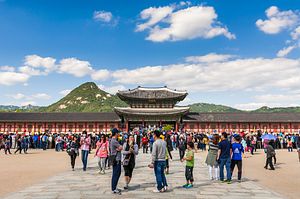South Korea’s income from tourism reached a record high last year of around $18.1 billion, mainly thanks to the increased number of Chinese tourists. According to data from the Korea Tourist Service, the number of Chinese tourists soared in 2014, up 41.6 percent from the previous year, and these tourists spent an average of $2,300 during their visits. The fact that Japanese tourists, once South Korea’s best customers, spent only $990 on average shows that how important Chinese tourists have become for South Korea’s tourism industry.
Since influx of a large number of Chinese tourists to Korea is relatively new, some say this is a good sign in terms of enhancing understanding between the two countries.
Not so, according to a recent survey by the Korean Association of Travel Agents. The association revealed that most of tour guides who handle Chinese tourists are Chinese passport holders, and they often impart wrong information about South Korean culture and history while on duty because they lack knowledge about Korea.
75 percent of tour guides from the top 30 travel agencies popular among Chinese tourists were Chinese passport holders, and that figure goes up to 84 percent when people with passports from Greater China are included.
The Korean Association of Travel Agents documented 104 cases where Chinese tourists were misled by these tour guides. Most of the cases involved the guides denigrating Korea, for example, by suggesting that Korea is a vassal state of China. Other cases involved imparting false information about Korea, including false stories about the origin of Hangul, the Korean alphabet (namely that the alphabet came from the shape of bars in a window).
There was one case of a Chinese tour guide saying that there are no pretty women in South Korea because the country gave all its beautiful women to China as a tribute during the Qing Dynasty. According to this guide, all the beautiful people in South Korea today benefited from plastic surgery. Another case involved Chinese tourists being taught that South Korea’s Gyeongbokgung Palace was designed in a certain way to make sure that Korean vassals would not be able to raise their heads when the Chinese envoy walked by.
The association said language issues are the reason there are so few Korean nationals serving as tour guides for Chinese groups. Tourism agencies specializing in Chinese tourists said they tend to get more complaints when they hire Korean guides because of language problems.
As of 2013, there were about 6,450 authorized Mandarin-speaking tour guides in Korea, but it is estimated that 50 percent of the tour guides catering to Chinese tourists are unauthorized and thus may be providing false information. The Seoul “Tourist Police” caught about 360 illegal tour guides last year, and the number is expected to grow.
In an effort to prevent such cases in the future, South Korea’s Ministry of Culture, Sports and Tourism released a guideline in October 2014, vowing to eradicate illegal tour guides. According to the new guideline, the ministry will beef up monitoring of tour guides and will give regular education to enhance guides’ understanding of Korean culture and history. The ministry’s announcement should be sure to act on its words — it is expected that South Korea will see more and more Chinese tourists in the future.

































